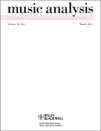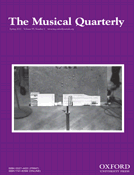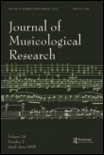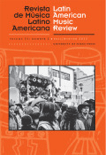
MUSIC ANALYSIS
Scope & Guideline
Deciphering the Language of Music through Analysis
Introduction
Aims and Scopes
- Empirical Analysis of Performance Practices:
The journal emphasizes empirical studies that analyze performance practices, such as the stylistic differences among orchestras, contributing to a deeper understanding of interpretative variations in musical works. - Theoretical Frameworks in Music Analysis:
A consistent focus on the development and application of theoretical frameworks, including Schenkerian analysis and other methodologies, allows for nuanced examinations of musical compositions and their structures. - Cross-Cultural and Genre Studies:
The inclusion of diverse musical genres and cultural contexts, such as the study of Arabic music and rock music, showcases the journal's commitment to broadening the scope of music analysis beyond Western classical traditions. - Historical and Contextual Perspectives:
Research that situates music within historical and socio-cultural contexts is prevalent, highlighting how historical developments influence compositional techniques and musical language. - Interdisciplinary Approaches:
The journal encourages interdisciplinary research that connects music analysis with fields such as sociology, psychology, and performance studies, fostering a comprehensive understanding of music's role in society.
Trending and Emerging
- Corpus Studies and Computational Methods:
An increasing focus on corpus studies and computational analysis reflects a trend towards data-driven approaches in music analysis, allowing for a broader understanding of musical trends and stylistic elements across various genres. - Improvisation and Performance Dynamics:
Emerging interest in the analysis of improvisatory practices and their relationship to composition highlights the importance of performance dynamics in understanding musical works. - Interdisciplinary Collaborations:
A trend towards interdisciplinary collaborations is evident, where music analysis intersects with fields such as cultural studies, gender studies, and technology, expanding the scope of inquiry and enriching analysis. - Exploration of Electronic and Popular Music:
The journal is increasingly publishing analyses of electronic and popular music, reflecting a broader acceptance and recognition of these genres within academic discourse on music. - Cultural and Contextual Music Analysis:
There is a growing trend to analyze music within its cultural and contextual frameworks, emphasizing the significance of socio-political factors and historical narratives in shaping musical expressions.
Declining or Waning
- Traditional Western Classical Analysis:
While still present, traditional analyses focusing exclusively on Western classical music forms and structures are appearing less frequently, possibly due to a growing interest in non-Western music and contemporary genres. - Strict Formalism:
There is a noticeable decline in purely formalist approaches to music analysis, which may indicate a shift towards more contextual and performance-oriented interpretations that consider the broader implications of music. - Historical Biographies and Compositional Intent:
Research centered around the biographies of composers and their intended meanings in compositions is waning, as scholars increasingly prioritize analytical methodologies that interrogate the music itself rather than the composers' narratives.
Similar Journals

Musicologist
Elevating Music Research to New HeightsMusicologist is a premier academic journal dedicated to the exploration and analysis of music theory, history, and practice, published by the esteemed Trabzon University State Conservatory in Turkey. With an ISSN of 2618-5652, this journal has been a vital platform for scholars since its inception in 2019, reflecting a commitment to fostering innovative research in the field of music. Recognized for its quality, the journal currently holds a Q2 ranking in the music category for 2023, placing it within the top segments of its discipline, as evidenced by its position at #72 out of 180 in the Scopus rankings, representing the 60th percentile. Although the journal employs a traditional publication model, it serves as a crucial repository for contemporary musicological discourse, aiming to advance knowledge and understanding within a vibrant academic community. Musicologist is not only a resource for seasoned researchers but also an invaluable tool for students and professionals alike, nurturing a comprehensive appreciation of music as an art form and scholarly pursuit.

MUSICAL QUARTERLY
Engaging Minds with Innovative Musical AnalysisMUSICAL QUARTERLY, published by Oxford University Press Inc, is a distinguished journal in the field of music, with a publication history that stretches back to 1915. This esteemed journal, identifiable by its ISSN 0027-4631 and E-ISSN 1741-8399, provides a critical platform for scholarly discourse, analysis, and research in musicology and related disciplines, facilitating an understanding of both historical and contemporary musical practices. Although it operates without open access, it continues to attract a diverse readership of researchers, educators, and students alike, thanks to its well-curated articles and reviews that engage with music theory, history, and ethnomusicology. With a current Scopus rank of #119 out of 180 in the Arts and Humanities category and a 34th percentile ranking in Music, MUSICAL QUARTERLY plays a vital role in advancing knowledge and fostering collaboration within the music academic community. Its commitment to high-quality scholarship is reflected in its ongoing efforts to address the evolving landscape of music studies, making it an essential resource for anyone serious about exploring the rich tapestry of music scholarship.

Revista de Musicologia
Innovating Insights for Music ScholarsRevista de Musicologia is a distinguished academic journal dedicated to the exploration and analysis of musicology, published by the SOC ESPANOLA MUSICOLOGIA. Based in Spain, this journal serves as a vital platform for music scholars, researchers, and enthusiasts to share innovative insights and original research concerning various aspects of music, including historical studies, ethnomusicology, and contemporary critiques. With its ISSN 0210-1459 and a current Scopus ranking placing it in the Q3 quartile of Music studies, the journal reflects a commitment to enhancing the discourse in this rich field. Although it currently does not publish under an open-access model, it continuously aims to provide a rigorous peer-reviewed environment for contributions that engage both academic inquiry and practical applications within musicology. The Revista de Musicologia is thus an essential resource for anyone in the field looking to expand their understanding and expertise in music studies from 2016 through 2024 and beyond.

Problemy Muzykalnoi Nauki-Music Scholarship
Celebrating the Intersection of Music and AcademiaWelcome to Problemy Muzykalnoi Nauki-Music Scholarship, a leading journal in the field of music scholarship published by the esteemed Gnesin Russian Academy of Music. With an ISSN of 2782-358X and an E-ISSN of 2782-3598, this Open Access journal has been committed to the dissemination of high-quality research since 2009, making scholarly work accessible to a global audience. Covering diverse aspects of music theory, history, and its socio-cultural impacts, Problemy Muzykalnoi Nauki serves as an essential platform for scholars, educators, and practitioners in the arts and humanities, as well as in social sciences related to music education. While its Scopus coverage was discontinued in 2021, the journal remains influential, holding a rank of #48 in the Arts and Humanities category and a percentile of 67th, showcasing its relevance and rigor in the discipline. We invite researchers and students alike to explore the rich contributions made within these pages, fostering a deeper understanding and appreciation of music in contemporary society.

JOURNAL OF MUSICOLOGICAL RESEARCH
Decoding the Language of Music through ResearchJOURNAL OF MUSICOLOGICAL RESEARCH, published by Taylor & Francis Ltd, is an esteemed platform that delves into the field of musicology, contributing to the ongoing dialogue in music research and scholarship since its establishment in 1979. With an ISSN of 0141-1896 and an E-ISSN of 1547-7304, this journal serves as a vital resource for researchers, professionals, and students, offering insights into diverse musicological topics. Although currently categorized in Q4 in Music with Scopus rankings placing it at #110 out of 180 in the Arts and Humanities field, its commitment to excellence and broader discourses in music studies is evident. The journal does not have Open Access options, yet it provides accessible content through reputable academic channels, fostering scholarly exchanges within the community. It aims to publish high-quality research that advances understanding of musical practices and cultural implications, making it a critical resource for those passionate about music and its myriad influences.

LATIN AMERICAN MUSIC REVIEW-REVISTA DE MUSICA LATINOAMERICANA
Innovating Research at the Intersection of Music and IdentityLATIN AMERICAN MUSIC REVIEW-REVISTA DE MUSICA LATINOAMERICANA stands as a prominent scholarly journal dedicated to the profound and diverse traditions of Latin American music. Published by University of Texas Press, this journal offers a platform for critical analysis, innovative research, and the dissemination of knowledge concerning the rich cultural heritage of Latin America. Although it currently does not provide open access options, the journal has made significant contributions to the field since its establishment, engaging a wide array of interdisciplinary perspectives. With coverage spanning from 2002 to 2009, the journal has been central to fostering scholarly dialogue and expanding the academic understanding of Latin American musicology, serving as an essential resource for researchers, professionals, and students alike. The journal is vital for those exploring the intersections of music, culture, and identity within the vibrant landscapes of Latin America.

Musica Oral del Sur
Connecting Cultures Through Musicology and EthnomusicologyMusica Oral del Sur is a prominent academic journal published by the Junta Andalucía through the Centro Documentación Musical Andalucía. With its ISSN 1138-8579 and E-ISSN 2445-0391, this pioneering publication has championed open access since 1995, providing a vital platform for scholars dedicated to the exploration of traditional and contemporary oral music practices in Southern Spain and beyond. The journal is essential for researchers, professionals, and students interested in musicology, ethnomusicology, and cultural studies, promoting scholarly discourse through a rich assortment of articles, reviews, and field research. Set in the vibrant cultural landscape of Granada, the journal encourages the fusion of theoretical insights with practical implications, making significant contributions to the understanding of oral musical traditions. By fostering accessible academic dialogue, Musica Oral del Sur plays an invaluable role in preserving and highlighting the heritage of Southern musical expressions while addressing contemporary issues in the field.

MUSIKFORSCHUNG
Cultivating Knowledge in the World of MusicMUSIKFORSCHUNG is a distinguished journal in the field of music studies, published by NEUWERK-BUCH UND MUSIKALIENHANDLUNG in Germany. With its ISSN 0027-4801, the journal caters to scholars, practitioners, and students interested in the diverse realms of musicology. Although it is currently not an Open Access publication, MUSIKFORSCHUNG plays a vital role in the academic landscape by disseminating research and critical discourse on music from various historical and contemporary perspectives. The journal has established its worth in the academic community, being categorized in the Q4 quartile in Music for 2023 and holding a rank of #169 out of 180 in the Scopus Arts and Humanities Music category, placing it within the 6th percentile. With publication activities spanning from 2002 to 2013 and resuming in 2016 through to 2024, MUSIKFORSCHUNG continues to be a crucial resource for those dedicated to advancing music scholarship. Set in the cultural heart of Kassel, Germany, the journal invites contributions that foster an understanding of music's impact on society and culture.

ACTA MUSICOLOGICA
Pioneering Conversations in the World of MusicologyACTA MUSICOLOGICA, published by the International Musicological Society, stands as a pivotal journal within the field of Musicology, garnering attention from scholars and practitioners alike. With its ISSN 0001-6241, the journal serves as a vital platform for innovative research and discourse from 2002 to 2013 and again from 2016 to 2024, achieving a Q2 ranking in the 2023 Music category. Reflecting a commitment to excellence, it ranks #105 out of 180 in Arts and Humanities Music according to Scopus, placing it at the 41st percentile among its peers. Although not open access, ACTA MUSICOLOGICA ensures the dissemination of significant musical research, fostering scholarly exchange and exploration. This esteemed publication is essential for researchers, professionals, and students looking to deepen their understanding of musicology and contribute to ongoing academic conversations.

MUSICAL TIMES
Unveiling the Cultural Dimensions of SoundMUSICAL TIMES is a distinguished journal dedicated to the exploration and dissemination of scholarly works in the realm of music, serving as an essential resource for researchers, professionals, and students alike. Published by MUSICAL TIMES PUBLICATIONS LTD, this journal has built a robust reputation within the arts and humanities, specifically focusing on music studies, with an impactful reach indicated by its Scopus ranking at #73 out of 106 in the field. Though access to this journal is not open, its curated content, which spans various facets of musicology and contemporary music discourse, enriches the academic community by encouraging insightful discussions and critical analyses. With its historical roots tracing back to its inception, MUSICAL TIMES aims to foster a deeper understanding of music's cultural, social, and artistic dimensions, making it a valued publication for those engaged in the scholarly pursuit of music.